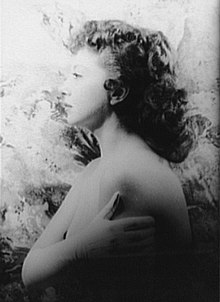Beverly Sills
American operatic soprano (1929-2007)
Beverly Sills (born Belle Silverman; 25 May 1929 – July 2, 2007) was a Grammy award winning coloratura soprano, perhaps the best-known American opera singer in the 1960s and 1970s.

Quotes
edit- I needed to sing — desperately. My voice poured out more easily because I was no longer singing for anyone's approval; I was beyond caring about the public's reaction, I just wanted to enjoy myself. … I had found a kind of serenity, a new maturity, as a result of my childrens' problems. I didn't feel better or stronger than anyone else but it seemed no longer important whether everyone loved me or not — more important now was for me to love them. Feeling that way turns your whole life around; living becomes the act of giving.
- Bubbles : A Self-Portrait (1976), p. 114
- A happy woman is one who has no cares at all; a cheerful woman is one who has cares but doesn't let them get her down.
- As quoted in The Quotable Woman (1978) by Elaine Partnow, p. 399
- There is a growing strength in women but it's in the forehead, not the forearm. Men will always be attracted to women with nice soft arms and a fleshy bosom.
- As quoted in TIME Vol. 120 (1982)
- Why should I go when it's going so good? … I lived through the garbage. I might as well dine on the caviar.
- So long as it doesn't get to the point where you don't remember whose opera you're listening to, I'm willing to experiment.
- As quoted in Newsweek, Vol. 103, (1984), p. iv
- I've always tried to go a step past wherever people expected me to end up. I'm not about to change now.
- Beverly : An Autobiography (1988), p. 356
- My voice had a long, nonstop career. It deserves to be put to bed with quiet and dignity, not yanked out every once in a while to see if it can still do what it used to do. It can't.
- As quoted in TIME (1983), and The Beacon Book of Quotations by Women (1992) by Rosalie Maggio
- Art is the signature of civilizations.
- As quoted in The Beacon Book of Quotations by Women (1992) by Rosalie Maggio
- I really do believe I can accomplish a great deal with a big grin, I know some people find that disconcerting, but that doesn't matter.
- As quoted in The Beacon Book of Quotations by Women (1992) by Rosalie Maggio
- There are no shortcuts to any place worth going.
- As quoted in Conquering an Enemy Called Average (1996) by John L. Mason
- You may be disappointed if you fail, but you are doomed if you don't try.
- As quoted in Incredible Quotations : 230 Thought-Provoking Quotes with Prompts to Spark Students' Writing, Thinking, and Discussion (1997) by Jacqueline Sweeney
Misattributed
edit- In youth, we run into difficulties. In old age, difficulties run into us.
- Josh Billings, as quoted in Mac's Giant Book of Quips and Quotes (1983) by E. C. McKenzie
- You don't always get what you ask for, but you never get what you don't ask for... unless it's contagious!
- Franklyn Broude, as quoted in Sitting on a File Cabinet, Naked, with a Gun: True Stories of Silicon Valley (2009) by Linda McFarland, Joanne Linden and Sharon Turnoy
- Christians should never fail to sense the operation of an angelic glory. It forever eclipses the world of demonic powers, as the sun does a candle's light.
- Billy Graham, as quoted in The Complete Idiot's Guide to the Book of Revelation (2001) by Stan Campbell and James S. Bell, p. 54
- Everything you need you already have. You are complete right now, you are a whole, total person, not an apprentice person on the way to someplace else. Your completeness must be understood by you and experienced in your thoughts as your own personal reality.
- Wayne Dyer, quoted in The Complete Idiot's Guide to Understanding Buddhism (2002) by Gary Gach, p. 285
- Attachment to spiritual things is... just as much an attachment as inordinate love of anything else.
- Thomas Merton, in New Seeds of Contemplation (1961)
- Anger begins with folly, and ends with repentance.
- Pythagoras, as quoted in Treasury of Thought : Forming an Encyclopædia of Quotations from Ancient and Modern Authors (1894) by Maturin Murray Ballou
- A primary function of art and thought is to liberate the individual from the tyranny of his culture in the environmental sense and to permit him to stand beyond it in an autonomy of perception and judgment.
- Lionel Trilling, in his introducton to Beyond Culture (1976) by Edward T. Hall
External links
edit- Beverly Sills: Made In America Interview
- Beverly Sills Online
- Beverly Sills at Answers.com
- Beverly Sills:Special mother to the special children
- Beverly Sills on IMDb
- Beverly Sills: National Women's Hall of Fame profile
- Beverly Sills: Made in America (PBS Great Performances)
- Beverly Sills at OperaMom.com
- The New York Times obituary (3 July 2007)